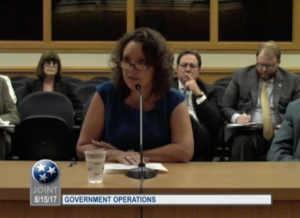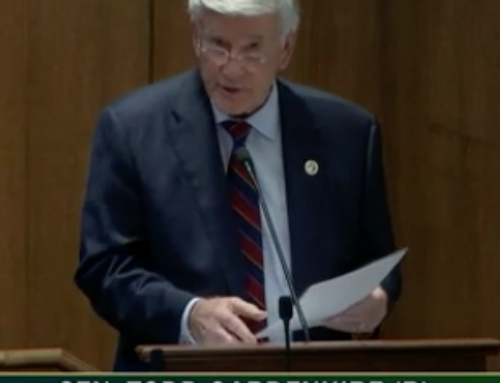TCOG raises serious concerns about museum commission’s restrictive speech policy
The Joint Government Operations Committee held a public hearing today on the Douglas Henry State Museum Commission’s new restrictive speech policy for its commissioners.
Below are comments I delivered as TCOG’s executive director outlining why the policy is at odds with open government, the Tennessee Constitution and the First Amendment of the U.S. Constitution. My comments were part of the public comments part of the hearing, which followed about an hour of questions from members of the joint committee, led by its two chairmen state Sen. Mike Bell and state Rep. Jeremy Faison. Almost all of the lawmakers expressed deep concern about the commission’s new policy and how it came about.
You can watch video from the full hearing here.
Museum commission chairman Tom Smith, museum executive director Ashley Howell, and assistant attorney general Alex Rieger defended the new Code of Conduct policy, saying it could help gain accreditation from the American Alliance of Museums.
The new policy requires commissioners to notify the commission before they make any public comments or talk to the news media about the museum, and provide the commission advance copies of what they plan to say. The new policy also prohibits disparagement of the museum or museum staff. If the policy is not followed, the commission can discipline, including censure and asking for or requiring a commissioner’s resignation.
You can watch public comments opposing the new policy from museum commissioner Victor Ashe, myself and Nashville attorney Henry Walker beginning at the roughly 1 hour and 5 minute mark of the video here.
Ashe, who was recently reappointed to the commission for another term by Lt. Gov. Randy McNally told the joint committee that Sen. McNally advised him not to sign the code of conduct compliance form..
My comments to the joint committee:
Tennessee Coalition for Open Government is a non-profit, non-partisan organization that conducts education and research, and advocates for transparency in government, mainly through our public records and open meetings laws.
TCOG represents open government interests of all citizens, and we have and have had on our board people who represent a variety of interests, such as newspapers and broadcast media, former mayors, the League of Women Voters, Beacon Center and the ACLU, and attorneys who specialize in First Amendment law.
We want to thank this committee for taking up this issue, which we believe has implications beyond the state museum commission.
I first became aware of the new Code of Conduct policy adopted by the State Museum Commission when I read about it on the Nashville Post website.
This policy requires all commission members except for the chair and vice chair to notify the commission before they speak with the news media, or make any statement to the public regarding the museum.
We think this policy chills the free flow of information about government, and are concerned that this commission is limiting what the public can know about their own government by limiting speech of members of the governing body.
Clearly, this would restrain the ability of commission members to talk to the public or a news reporter, if commission members, after receiving a call, had to get a list of questions in advance, determine how they will answer the questions, and notify the commission about what they plan to say. Essentially, get clearance.
Most of the commissioners are appointed by the governor or members of the General Assembly. However, if a commissioner doesn’t follow this new governance procedure adopted by the commission, he or she can be forced to resign from the commission by a commission vote.
Additionally, under this new policy, if fellow commission members view a commissioner’s comments to be disparaging, the commissioner can be forced to resign.
These are extreme and unnecessary limits. They also has potential to be unequally applied.
For example, after the very board meeting in which the policy was adopted, a commission member – House Speaker Beth Harwell – talked with a reporter about the commission’s actions.
I would doubt very much that she had notified the entire commission before speaking with the news reporter. Is Speaker Harwell to be warned or censured for not providing prior notification?
What if a commissioner said something like, “I think we need to do a much better job in outreach to the community about the state museum.” Could such a statement be viewed as publicly disparaging to museum staff since it could imply that the museum staff is not doing a good job now?
This is just the museum commission. What if every state board and commission decided to implement something similar? Are we on the road to limit all speech about government affairs by citizens or elected officials serving on governing bodies?
Such limits do not serve the purpose of preserving the trust and confidence of the public. Trust and confidence in our government is shored up by the knowledge that members of a governing body CAN speak freely. That they aren’t controlled by government and restricted by government.
“The free communication of thoughts and opinions, is one of the invaluable rights of man and every citizen may freely speak, write, and print on any subject, being responsible for the abuse of that liberty…” This is in our Tennessee Constitution.
Restraint by government on speech about our government — and certainly of speech of members of a governing body — is repugnant to the First Amendment of the U.S. Constitution and to our own state’s constitution and values.
I hope that this committee can help get us off this dangerous and unconstitutional path. Thank you again, committee members, for holding this hearing.





